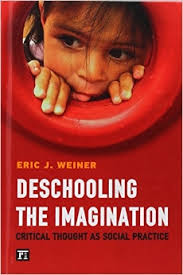How does Wikipedia really impact research, knowledge and literacy? How can we unlock the imaginative capacities of learners by engaging in the development of critical and creative minds? The OISE library has added a few new titles to help answer these insightful questions as they relate to studies in education. Come and visit us soon!
Deschooling the imagination: critical thought as social practice by Eric J. Weiner is a worthy read if you’d like to learn what it means to be actively engaged in developing a critical/creative mindset against the prevailing ideology of our public schools. It also covers the social/cultural relationship between what and how we learn versus our imaginative capacities. Most importantly, this book teaches how to be an educator in the service of a revived critical/creative imagination.
Since its launch in 2001, Wikipedia has been a lightning rod for debates about knowledge and traditional authority. It has come under particular scrutiny from publishers of print encyclopedias and college professors, who are skeptical about whether a crowd-sourced encyclopedia—in which most entries are subject to potentially endless reviewing and editing by anonymous collaborators whose credentials cannot be established—can ever truly be accurate or authoritative.
In Wikipedia U : knowledge, authority, and liberal education in the digital age ,Thomas Leitch argues that the assumptions these critics make about accuracy and authority are themselves open to debate. After all, academics are expected both to consult the latest research and to return to the earliest sources in their field, each of which has its own authority. And when teachers encourage students to master information so that they can question it independently, their ultimate goal is to create a new generation of thinkers and makers whose authority will ultimately supplant their own. Wikipedia U offers vital new lessons about the nature of authority and the opportunities and challenges of Web 2.0.
Available in both print and online from the OISE library, The Gamification of higher education : developing a game-based business strategy in a disrupted marketplace
If we could design an educational experience where learning was a part of personal growth and development, would we create empowered individuals who would be better positioned to make a contribution upon their entry into the real world? Neil B. Niman says gamification has the potential to do just that.
Instead of thinking about education as the mastery of a body of knowledge where the subject matter becomes the focus of our attention, The gamification of higher education encourages us to think of it as a process that draws out the best in individuals and prepares them for happy, productive, and successful lives. Niman reveals how the power of games can be used to create an entirely new population of super-empowered individuals who are better positioned to acquire the skills they need to remain relevant in an ever-changing economy.
Jessica Perich Carleton says dramatic play can be applied to a diverse range of school subjects and recreational settings and is guaranteed to enhance students’ learning and encourage artistic expression. Lesson plans in Story drama in the special needs classroom : step-by-step lesson plans for teaching through dramatic play take teachers through every aspect of running fun and engaging story dramas with ways to adapt them to meet the needs of the inclusive or special needs group.

